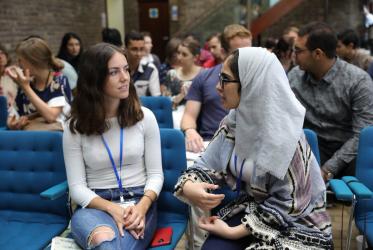Displaying 1 - 20 of 24
Brazilian churches call for transformative racial justice
23 November 2020
Fr Alexi - a peacemaker in Syria
21 December 2018
Romani people seek “lives of decency, dignity, and justice”
27 September 2018
#WCC70: A story of life
07 June 2018
G20 summit: call to pray for peace in Hamburg
07 July 2017
WCC urges responsibility for and support to the refugees in Europe
04 September 2015
Faith organizations assess COP 20 on the way to Paris
28 January 2015
Christians around the world pray for unity
22 January 2015
Momentum builds for ban on nuclear weapons
16 December 2014
Indigenous faith leaders reflect on resilience and climate change
23 September 2014











